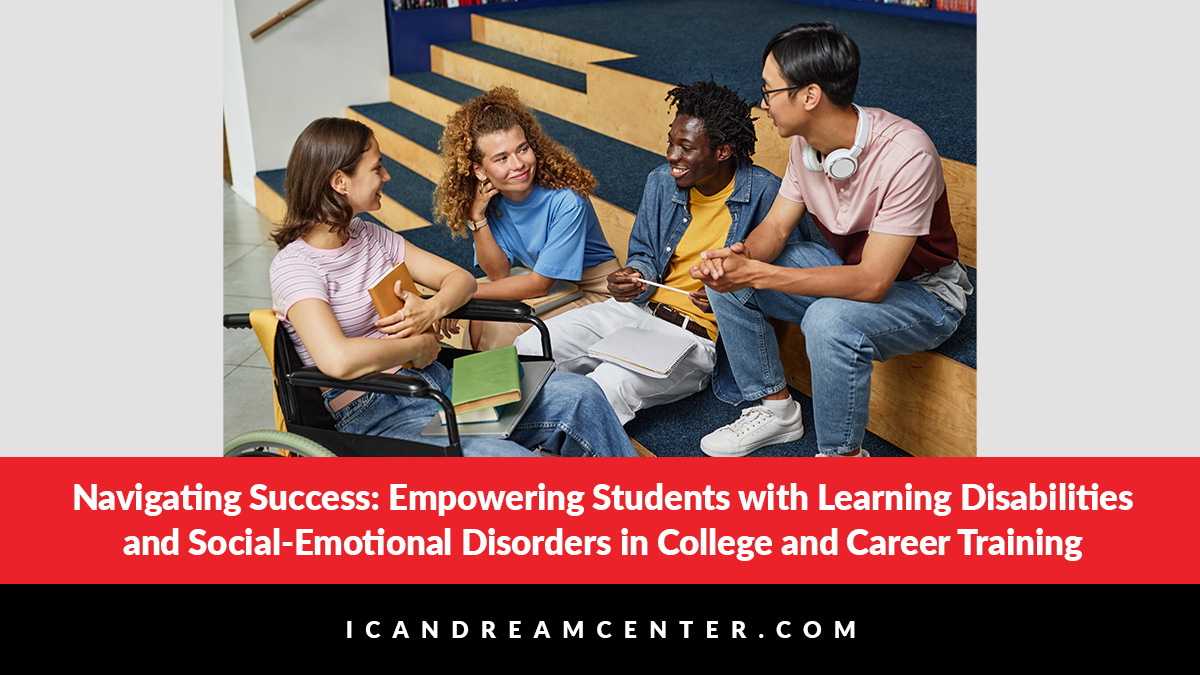
Navigating Success: Empowering Students with Learning Disabilities and Social-Emotional Disorders in College and Career Training
The journey through higher education and career training can be both exciting and challenging, regardless of one’s background. For students with learning disabilities and social-emotional disorders, this journey can present unique obstacles. However, with the right support, strategies, and mindset, these individuals can absolutely thrive in college and career training, paving the way for a fulfilling and successful future.
- Embracing Individuality and Self-Advocacy
One of the most empowering steps for students with learning disabilities and social-emotional disorders is embracing their individuality. Recognizing their strengths, weaknesses, and unique learning styles can provide a solid foundation for success. Encouraging self-advocacy is crucial – students should learn to communicate their needs to professors, advisors, and peers to ensure they receive the appropriate support.
- Accessing Support Services
Colleges and career training institutions often offer a range of support services tailored to students with learning disabilities and social-emotional disorders. These services may include tutoring, accessible technology, counseling, and extended testing time. Students should be proactive in utilizing these resources to overcome academic challenges and enhance their learning experience.
- Time Management and Organization
Students with learning disabilities and social-emotional disorders can benefit immensely from effective time management and organizational strategies. Developing study schedules, using digital tools, and breaking tasks into smaller, manageable steps can help students stay on track and reduce feelings of overwhelm.
- Building a Support Network
Creating a strong support network is vital. Family, friends, mentors, and support groups can offer encouragement, understanding, and guidance. Connecting with peers who share similar experiences can also provide a sense of community and camaraderie.
- Cultivating Resilience and Coping Strategies
College and career training can be stressful, even for those without learning disabilities or social-emotional disorders. It’s important for students to cultivate resilience and healthy coping strategies. Mindfulness, meditation, exercise, and engaging in hobbies can all contribute to a balanced and resilient mindset.
- Capitalizing on Strengths
Students with learning disabilities and social-emotional disorders often possess unique strengths, such as creativity, empathy, problem-solving skills, and adaptability. These strengths can translate well into various fields and industries. Encouraging students to explore career paths that align with their strengths can lead to a more fulfilling and successful professional journey.
- Seeking Inclusive Environments
When selecting colleges or career training programs, it’s wise to consider institutions that prioritize inclusivity and diversity. Such environments tend to be more understanding and accommodating of students with diverse learning needs and social-emotional challenges.
- Transitioning to the Workforce
As students transition from education to the workforce, it’s important to continue utilizing the strategies and support mechanisms that have proven effective during their academic journey. Additionally, disclosing disabilities to employers and seeking workplace accommodations can ensure a more comfortable and productive work experience.
The path to success in college and career training for students with learning disabilities and social-emotional disorders may have its share of challenges, but it is absolutely navigable. With a combination of self-awareness, proactive support-seeking, and the cultivation of essential skills, these individuals can flourish academically and professionally. By embracing their uniqueness, advocating for their needs, and capitalizing on their strengths, students can build a foundation for a bright and promising future.
